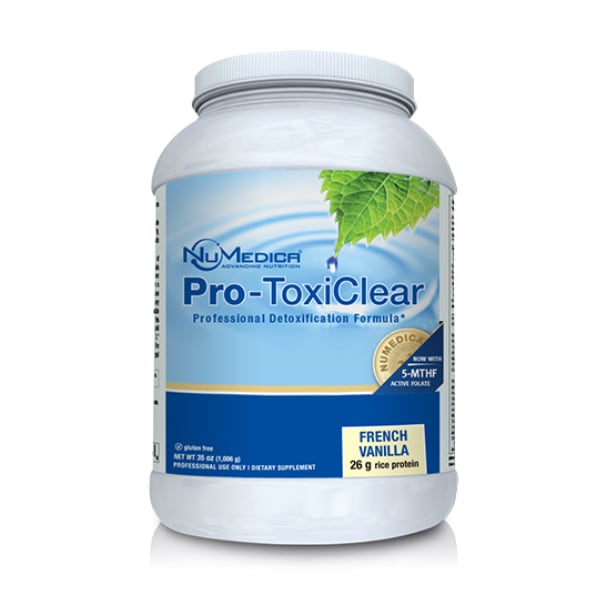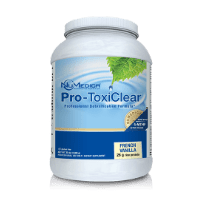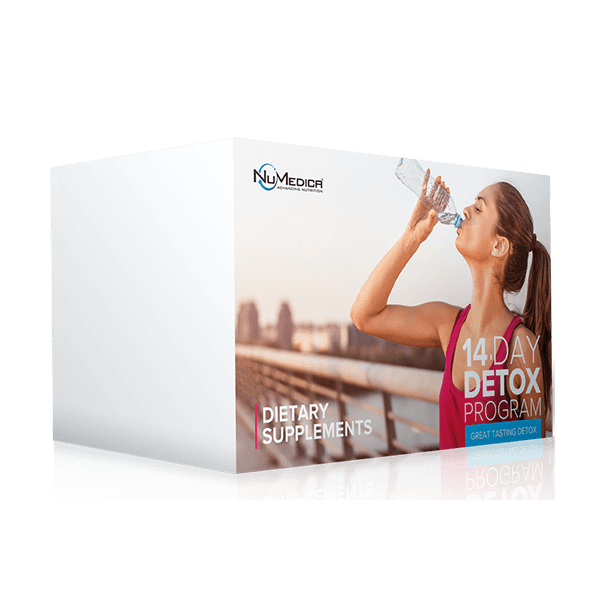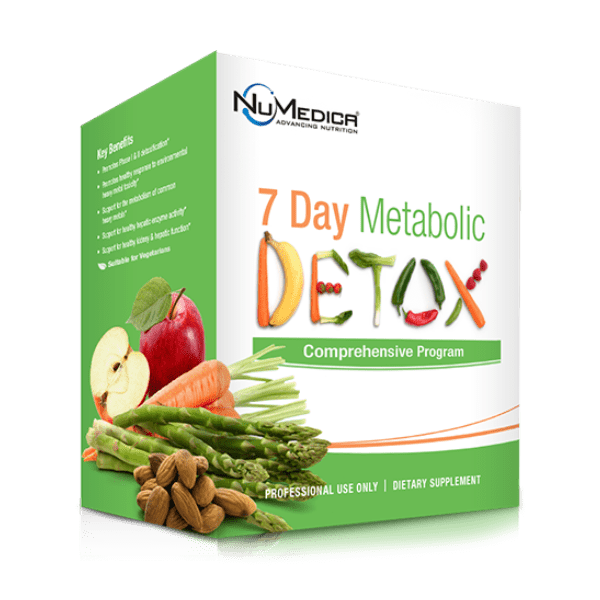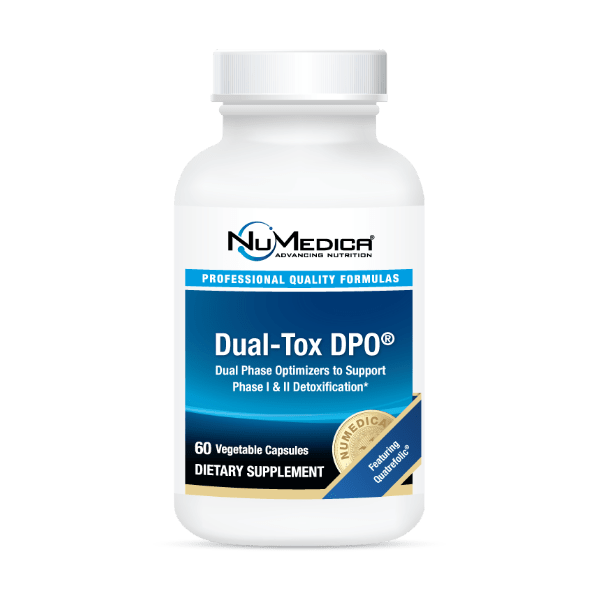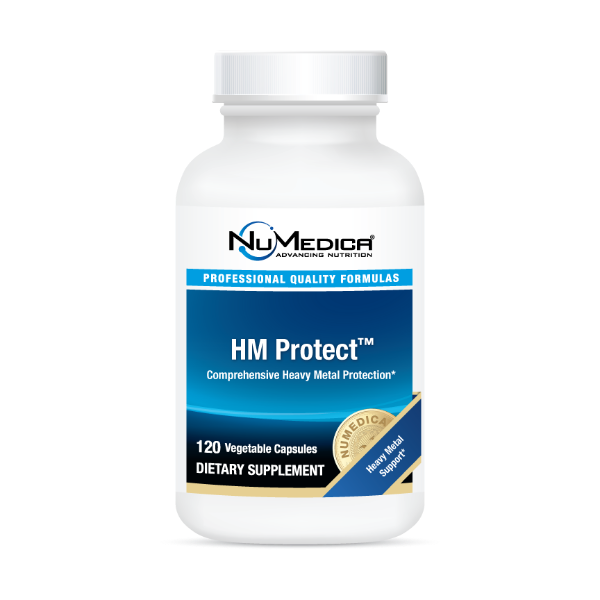Pro-ToxiClear
by NuMedica
21 Servings | VanillaNuMedica Pro-ToxiClear
Professional Detoxification Formula*
Powerful supplement that supports the Phase 1 and Phase 2 liver detoxification pathways and enhances gastrointestinal health.*
-
Description*
Advanced Detoxification
NuMedica Pro ToxiClear is an innovative supplement designed to support advanced detoxification. Detoxification is the process by which your body can remove toxins that are potentially harmful and certainly unwanted by your system. NuMedica has created this advanced formula with targeted nutrients that are known for their ability to enhance the detox process. With its 24 grams of high-quality, hypoallergenic rice protein, NuMedica Pro ToxiClear is ideal for supporting your liver during the detox process.
Benefits of NuMedica Pro ToxiClear
NuMedica Pro ToxiClear contains an extensive array of nutrients that support the detox process. Your liver is hard working, so supporting it with vital nutrients makes healthy sense. Every day our bodies face toxins-from our foods to our environment. Before these toxins can detract from our health, it's up to our liver to flush them from our body through the process of detoxification. NuMedica Pro ToxiClear supports the liver through each phase of detox to help remove harmful toxins from the body before they can wreak havoc.
NuMedica Pro ToxiClear: A Nutritional Powerhouse
NuMedica Pro ToxiClear contains a nutrient-enriched formula that supports detoxification and also provides gastrointestinal support by restoring the pH balance of the gut. Its rice protein is low in heavy metals and features an excellent amino acid profile. Dietary protein has the added feature of enhancing muscle rejuvenation and repair while complementing weight loss.
-
Directions
Serving Size: 2 Scoops (58g)
Servings Per Container: 21
Directions: Stir or blend 2 scoops (58 grams) into 12 ounces of water or juice or as directed by your healthcare practitioner.
-
Ingredients
Nutrient/Ingredient Amount % Daily ValueDV 1 Calories Calories
When people talk about the calories in food, what do they mean? A calorie is a unit of measurement—but it doesn't measure weight or length. A calorie is a unit of energy. When you hear something contains 100 calories, it's a way of describing how much energy your body could get from eating or drinking it.
KidsHealth from Nemours, https://kidshealth.org/en/kids/calorie.html
190 Two Scoops (52 g) Contain:
Total Fat Total Fat
This number on a food label indicates how much fat is in a single serving of a food. Limit total fat to less than 25% to 35% percent of the calories you consume each day. All fats have 9 calories per gram.
WebMD, https://www.webmd.com/food-recipes/definitions-glossary
4.5 g Saturated Fat Saturated Fat
Usually solid at room temperature, saturated fats are found in animal products such as meat and milk, as well as in coconut and palm oil. Saturated fat is often used in foods to prevent rancidity and off flavors. No more than 5% to 10% of your total daily calories should come from saturated fat.
WebMD, https://www.webmd.com/food-recipes/definitions-glossary
0.5 g Total Carbohydrate Total Carbohydrate
This number on a food label indicates how many grams of carbohydrates are in a single serving of a food.
WebMD, https://www.webmd.com/food-recipes/definitions-glossary
10 g Dietary Fiber Dietary Fiber
The part of plant foods that we cannot digest. Whole grains, fruits, vegetables, nuts, and seeds contain fiber. Fiber helps fill you up, can help lower cholesterol, and keeps you regular. You need at least 25 to 38 grams daily. To be considered high in fiber, a food must contain least 5 grams per serving.
WebMD, https://www.webmd.com/food-recipes/definitions-glossary
4 g Total Sugars Total Sugars
This section of the nutrition label lists added and natural sugars separately. Added sugars include sucrose, glucose, fructose, and corn and maple syrups. Natural sugars include lactose in milk and fructose in fruit. If you are concerned about your intake of sugar, be sure added sugars are not one of the first few items in a food's ingredients list.
WebMD, https://www.webmd.com/food-recipes/definitions-glossary
2 g Protein Protein
Protein in food labeling is the amount of Protein in 100g of the total component. From a nutritional point of view Protein quality labeling is associated with the number and types of amino acid found that can complement the body amino acid requirement and how much of the amino acid in the particular food is appropriate for body protein formation, which is associated with biological value, digestibility, efficiency ratio, and amino acid ration. Protein in nutrition plays a crucial role in almost all biological processes and amino acids are the building blocks of it. A large proportion of our cells, muscles and tissue is made up of amino acids, meaning they carry out many important bodily functions, such as giving cells their structure.
ResearchGate, https://www.researchgate.net/post/What_classifies_protein_in_the_context_of_nutrition_facts_labeling
26 g Vitamin A (as beta carotene) (5,000 IU) Vitamin A
A nutrient that the body needs in small amounts to function and stay healthy. Vitamin A helps in vision, bone growth, reproduction, growth of epithelium (cells that line the internal and external surfaces of the body), and fighting infections. It is fat-soluble (can dissolve in fats and oils). Vitamin A is found in liver, egg yolks, and whole milk dairy products from animals and in fish oils. It can also be made in the body from a substance found in some fruits and vegetables, such as cantaloupes, carrots, spinach, and sweet potatoes. Vitamin A is being studied in the prevention and treatment of some types of cancer. Also called retinol.
NIH National Cancer Institute, https://www.cancer.gov/publications/dictionaries/cancer-terms/def/vitamin-a
1,500 mcg RAE Vitamin D3 (as cholecalciferol) (65 IU) Vitamin D3
Vitamin D is a nutrient you need for good health. It helps your body absorb calcium, one of the main building blocks for strong bones. Together with calcium, vitamin D helps protect you from developing osteoporosis, a disease that thins and weakens the bones and makes them more likely to break. Your body needs vitamin D for other functions too. Your muscles need it to move, and your nerves need it to carry messages between your brain and your body. Your immune system needs vitamin D to fight off invading bacteria and viruses.
https://ods.od.nih.gov/factsheets/VitaminD-Consumer/
2 mcg Vitamin C (as ascorbate blend) Vitamin C
Vitamin C, also known as ascorbic acid, is a water-soluble nutrient found in some foods. In the body, it acts as an antioxidant, helping to protect cells from the damage caused by free radicals. Free radicals are compounds formed when our bodies convert the food we eat into energy. People are also exposed to free radicals in the environment from cigarette smoke, air pollution, and ultraviolet light from the sun.
https://ods.od.nih.gov/factsheets/VitaminC-Consumer/
220 mg Vitamin E (as d-alpha tocopherol acetate) (110 IU) Vitamin E
Vitamin E is a nutrient that's important to vision, reproduction, and the health of your blood, brain and skin. Vitamin E also has antioxidant properties. Antioxidants are substances that might protect your cells against the effects of free radicals - molecules produced when your body breaks down food or is exposed to tobacco smoke and radiation. Free radicals might play a role in heart disease, cancer and other diseases. If you take vitamin E for its antioxidant properties, keep in mind that the supplement might not offer the same benefits as naturally occurring antioxidants in food.
https://www.mayoclinic.org/drugs-supplements-vitamin-e/art-20364144
74 mg Thiamin (as thiamin hydrochloride) Thiamin
Vitamin B1, thiamin, or thiamine, enables the body to use carbohydrates as energy. It is essential for glucose metabolism, and it plays a key role in nerve, muscle, and heart function.
https://www.medicalnewstoday.com/articles/219545
5 mg Vitamin B6 (as pyridoxal-5'-phosphate) Vitamin B6
Vitamin B6 is a vitamin that is naturally present in many foods. The body needs vitamin B6 for more than 100 enzyme reactions involved in metabolism. Vitamin B6 is also involved in brain development during pregnancy and infancy as well as immune function.
https://ods.od.nih.gov/factsheets/VitaminB6-Consumer/
6 mg Folate (as 200 mcg 6(S)-5-methyltetrahydrofolic acid, glucosamine salt) Folate
Folate is a B-vitamin that is naturally present in many foods. Your body needs folate to make DNA and other genetic material. Your body also needs folate for your cells to divide. A form of folate, called folic acid, is used in fortified foods and most dietary supplements.
https://ods.od.nih.gov/factsheets/Folate-Consumer/ 340 mcg DFE Vitamin B12 (as methylcobalamin) Vitamin B12
Vitamin B12 is a nutrient that helps keep your body's blood and nerve cells healthy and helps make DNA, the genetic material in all of your cells. Vitamin B12 also helps prevent megaloblastic anemia, a blood condition that makes people tired and weak.
https://ods.od.nih.gov/factsheets/VitaminB12-Consumer/
22 mcg Biotin Biotin
Biotin is a B-vitamin found in many foods. Biotin helps turn the carbohydrates, fats, and proteins in the food you eat into the energy you need.
https://ods.od.nih.gov/factsheets/Biotin-Consumer/
320 mcg Pantothenic Acid (as d-calcium pantothenate) Pantothenic Acid
Pantothenic acid (also called vitamin B5) helps turn the food you eat into the energy you need. It's important for many functions in the body, especially making and breaking down fats.
https://ods.od.nih.gov/factsheets/PantothenicAcid-Consumer/
6 mg Calcium (di-calcium malate) Calcium
Calcium is a mineral found in many foods. The body needs calcium to maintain strong bones and to carry out many important functions. Almost all calcium is stored in bones and teeth, where it supports their structure and hardness.
National Institutes of Health, Office of Dietary Supplements
150 mg Iron Iron
Iron is a mineral that is naturally present in many foods, added to some food products, and available as a dietary supplement. Iron is an essential component of hemoglobin, an erythrocyte (red blood cell) protein that transfers oxygen from the lungs to the tissues. As a component of myoglobin, another protein that provides oxygen, iron supports muscle metabolism and healthy connective tissue. Iron is also necessary for physical growth, neurological development, cellular functioning, and synthesis of some hormones.
National Institutes of Health, Office of Dietary Supplements
5 mg Phosphorus (as di-potassium phosphate and rice protein) Phosphorus
Phosphorus is a mineral contained in each cell in our body. Most phosphorus is in the bones and teeth, and some is in your genes. Your body needs phosphorus to make energy and to carry out many important chemical processes.
https://ods.od.nih.gov/factsheets/Phosphorus-Consumer/
660 mg Iodine (as potassium iodide) Iodine
Iodine is a mineral found in some foods. The body needs iodine to make thyroid hormones. These hormones control the body's metabolism and many other important functions. The body also needs thyroid hormones for proper bone and brain development during pregnancy and infancy. Getting enough iodine is important for everyone, especially infants and women who are pregnant.
https://ods.od.nih.gov/factsheets/Iodine-Consumer/
55 mcg Manganese (as manganese bisglycinate chelate) Manganese
Your body uses manganese to make energy and protect your cells from damage. Your body also needs manganese for strong bones, reproduction, blood clotting, and a healthy immune system.
https://ods.od.nih.gov/factsheets/Manganese-Consumer/
1.8 mg Magnesium (as di-magnesium malate) Magnesium
Magnesium is a mineral that's crucial to the body's function. Magnesium helps keep blood pressure normal, bones strong, and the heart rhythm steady.
https://www.webmd.com/diet/supplement-guide-magnesium#1
155 mg Zinc (as zinc bisglycinate chelate) Zinc
Zinc is found in cells throughout the body. It helps the immune system fight off invading bacteria and viruses. The body also needs zinc to make proteins and DNA, the genetic material in all cells. During pregnancy, infancy, and childhood, the body needs zinc to grow and develop properly. Zinc also helps wounds heal and is important for proper senses of taste and smell.
https://ods.od.nih.gov/factsheets/Zinc-Consumer/
12 mg Selenium (as selenium glycinate complex) Selenium
Selenium is a nutrient that the body needs to stay healthy. Selenium is important for reproduction, thyroid gland function, DNA production, and protecting the body from damage caused by free radicals and from infection.
https://ods.od.nih.gov/factsheets/selenium-consumer/
55 mcg Chromium (as chromium nicotinate glycinate chelate) Chromium
Chromium is an essential trace mineral that can improve insulin sensitivity and enhance protein, carbohydrate, and lipid metabolism.
https://www.medicalnewstoday.com/articles/288177
55 mcg Molybdenum (as molybdenum glycinate chelate) Molybdenum
Your body uses molybdenum to process proteins and genetic material like DNA. Molybdenum also helps break down drugs and toxic substances that enter the body.
https://ods.od.nih.gov/factsheets/Molybdenum-Consumer/
150 mcg Sodium Sodium
While sodium (commonly called salt) is vital for healthy nerves and muscles, most of us get too much salt in our diet, often from processed foods. Read food labels to help keep your sodium intake to 2,300 milligrams a day or less. Persons 51 and older, African Americans, or people who have hypertension, diabetes or chronic kidney disease should limit sodium to 1500 milligrams daily.
WebMD, https://www.webmd.com/food-recipes/definitions-glossary
125 mg Potassium Potassium
Potassium. Essential for life, potassium helps maintain normal blood pressure and keeps your heart and kidneys working normally. Potassium is found in bananas, nuts, potatoes, dairy, and other foods. Adults should aim for 4,700 milligrams of potassium daily.
WebMD, https://www.webmd.com/food-recipes/definitions-glossary
1,170 mg Flaxseed Oil (Linum usitatissimum) Flaxseed Oil
Flaxseed oil comes from flaxseed (Linum usitatissimum). It is a good source of an essential omega-3 fatty acid called alpha-linolenic acid (ALA).
The alpha-linolenic acid and other chemicals in flaxseed oil seem to decrease swelling, which is why some people use it for conditions that involve inflammation, such as rheumatoid arthritis.https://www.webmd.com/vitamins/ai/ingredientmono-990/flaxseed-oil
9,000 mg L-Leucine (from L-Leucine and Rice Protein) L-Leucine
Like valine, leucine is a branched-chain amino acid that is critical for protein synthesis and muscle repair. It also helps regulate blood sugar levels, stimulates wound healing and produces growth hormones
https://www.healthline.com/nutrition/10-high-leucine-foods
2,393 mg L-Glycine (from L-Glycine and Rice Protein) L-Glycine
Glycine is an amino acid with many impressive health benefits. Your body needs glycine to make important compounds, such as glutathione, creatine and collagen. This amino acid may also protect your liver from alcohol-induced damage and improve sleep quality and heart health. What's more, glycine may also benefit people with type 2 diabetes and protect against muscle loss that occurs with muscle-wasting conditions.
https://www.healthline.com/nutrition/glycine
2,287 mg L-Valine (from L-Valine and Rice Protein) L-Valine
L-valine is the L-enantiomer of valine. It has a role as a nutraceutical, a micronutrient, a human metabolite, an algal metabolite, a Saccharomyces cerevisiae metabolite, an Escherichia coli metabolite and a mouse metabolite. It is a pyruvate family amino acid, a proteinogenic amino acid, a valine and a L-alpha-amino acid. It is a conjugate base of a L-valinium. It is a conjugate acid of a L-valinate. It is an enantiomer of a D-valine. It is a tautomer of a L-valine zwitterion.
http://www.ebi.ac.uk/chebi/searchId.do?chebiId=CHEBI:16414
1,710 mg L-Isoleucine (from Rice Protein) L-Isoleucine
Isoleucine has a role in the detoxification of nitrogenous waste like ammonia, which is then excreted from the body by the kidneys. Isoleucine is also essential for the production and formation of hemoglobin and the production of red blood cells.
https://www.news-medical.net/life-sciences/What-are-Leucine-and-Isoleucine.aspx
1,105 mg L-Taurine L-Taurine
Taurine is an amino sulfonic acid that occurs naturally in your body. It is particularly concentrated in your brain, eyes, heart and muscles.
Taurine is classified as a conditionally essential amino acid. It serves various important functions in your body.
L Taurine is the L isomer of the taurine molecule. There are two stereoisomers as L Taurine and D taurine. Among them, the most abundant and most important form is the L isomer.
https://www.healthline.com/nutrition/what-is-taurine#what-it-is
https://www.differencebetween.com/difference-between-taurine-and-l-taurine/
1,000 mg L-Threonine (from Rice Protein) L-Threonine
Threonine is an essential amino acid in humans (provided by food), Threonine is an important residue of many proteins, such as tooth enamel, collagen, and elastin. An important amino acid for the nervous system, threonine also plays an important role in porphyrin and fat metabolism and prevents fat buildup in the liver. Useful with intestinal disorders and indigestion, threonine has also been used to alleviate anxiety and mild depression.
https://pubchem.ncbi.nlm.nih.gov/compound/l-Threonine
975 mg L-Lysine (from Rice Protein) L-Lysine
Lysine is an amino acid (a building block of protein). Unlike some other amino acids, the human body cannot make lysine, so it must be eaten in the diet. Sources of lysine include meat, fish, dairy, eggs, and some plants such as soy.
https://www.webmd.com/vitamins/ai/ingredientmono-237/lysine
812 mg L-Cysteine (from L-Cysteine and Rice Protein) L-Cysteine
L-cysteine is an amino acid found naturally in the human body. It is one of the amino acids that are building blocks of the powerful antioxidant glutathione. It also is found in many protein-rich foods and sold as a dietary supplement.
https://www.verywellhealth.com/the-benefits-of-l-cysteine-89468
670 mg Protease Protease
A protease (also called a peptidase or proteinase) is an enzyme that catalyzes (increases reaction rate or "speeds up") proteolysis, the breakdown of proteins into smaller polypeptides or single amino acids. They do this by cleaving the peptide bonds within proteins by hydrolysis, a reaction where water breaks bonds. Proteases are involved in many biological functions, including digestion of ingested proteins, protein catabolism (breakdown of old proteins), and cell signaling.
https://en.wikipedia.org/wiki/Protease
300 mg Calcium D-Glucarate Calcium D-Glucarate
Calcium D-glucarate is a chemical. It is similar to a naturally occurring chemical called glucaric acid. Glucaric acid is found in our bodies as well as in fruits and vegetables such as oranges, apples, brussels sprouts, broccoli, and cabbage. Calcium D-glucarate is made by combining glucaric acid with calcium to make supplements that people use for medicine.
https://www.webmd.com/vitamins/ai/ingredientmono-136/calcium-d-glucarate
250 mg N-Acetyl L-Cysteine N-Acetyl L-Cysteine
Cysteine is a semi-essential amino acid. It's considered semi-essential because your body can produce it from other amino acids, namely methionine and serine. It becomes essential only when the dietary intake of methionine and serine is low.
Cysteine is found in most high-protein foods, such as chicken, turkey, yogurt, cheese, eggs, sunflower seeds and legumes.
N-acetyl cysteine (NAC) is a supplement form of cysteine.
Consuming adequate cysteine and NAC is important for a variety of health reasons - including replenishing the most powerful antioxidant in your body, glutathione. These amino acids also help with chronic respiratory conditions, fertility and brain health.
https://www.healthline.com/nutrition/nac-benefits
55 mg L-Glutathione L-Glutathione
Glutathione is a substance made from the amino acids glycine, cysteine, and glutamic acid. It is produced by the liver and involved in many body processes.
Glutathione is involved in tissue building and repair, making chemicals and proteins needed in the body, and in immune system function.https://www.webmd.com/vitamins/ai/ingredientmono-717/glutathione
29 mg 1 The % Daily Value tells you how much a nutrient in a serving of food contributes to a daily diet. 2,000 calories a day is used for general nutrition advise. -
Related Content*
Since 2010 SupplementRelief.com has provided professional-grade supplements supported by practical wellness content focussed on healthy living, risk reduction, and chronic disease elimination.

SupplementRelief.com promotes a lifestyle of well-being with emphasis on whole-foods nutrition, reasonable exercise, stress management, proper sleep, and the use of targeted, high-quality supplements to augment what is missing in our diet. We encourage others to live better through making small, gradual, healthy changes to lifestyle behaviors.
Jay is a founder of SupplementRelief.com and has provided customer service, managed and operated the business ever since.
We welcome your ![]() call at (888) 424-0032 or
call at (888) 424-0032 or ![]() email anytime. We can't always respond immediately, but we will do so soon. We are even known to respond after hours and on weekends! Learn more about us.
email anytime. We can't always respond immediately, but we will do so soon. We are even known to respond after hours and on weekends! Learn more about us.
-
 Discussion Forum
Questions or Feedback?
Discussion Forum
Questions or Feedback?Ask questions. Share your thoughts. Note that we cannot answer questions relating to specific medical conditions - please refer those to your qualified healthcare provider.
Post a new Comment or Reply to an existing one. Help for using the Discussion Forum.
 Discussion Forum Help
Discussion Forum Help
Comments are displayed in order of the last one posted so the most recent one is at the top and the oldest one at the bottom.
Replies within a Comment are displayed in reverse order with the oldest one at the top and the most recent one at the bottom.
Each post identifies
 who made the post and the
who made the post and the  date and time the post was made.
date and time the post was made.Mouse over the icons for tooltips that explain what they mean.

If you see this icon you can attach an Audio file to your post.

If you see this icon you can attach a Document file to your post.

If you see this icon you can attach an Image file to your post.

If you see this icon you can attach a Video file to your post.
You will see the
 Ban icon (Report Post as SPAM) immediately following the Timestamp of the post. Click this icon if you feel strongly that the content posted is not appropriate and should be reviewed by the Forum Moderator. You will be provided with a confirmation dialog to be sure you wish to submit this post for review. If submitted, the Forum Moderator will be notified to review the post and will determine what type of action to take.
Ban icon (Report Post as SPAM) immediately following the Timestamp of the post. Click this icon if you feel strongly that the content posted is not appropriate and should be reviewed by the Forum Moderator. You will be provided with a confirmation dialog to be sure you wish to submit this post for review. If submitted, the Forum Moderator will be notified to review the post and will determine what type of action to take.Click
 in the upper right corner of this Help modal or anywhere on the web page outside of the modal to exit Help.
in the upper right corner of this Help modal or anywhere on the web page outside of the modal to exit Help.
![]() Session Expired from Inactivity
Session Expired from Inactivity
Do you want to?
9618 Jefferson Highway, Suite D-191
Baton Rouge LA 70809-9636
(888) 424-0032 |
support@supplementrelief.com
* Disclaimer: This page is available exclusively for SupplementRelief.com clients. None of the information on this website is intended to replace your relationship with your healthcare provider(s). Nothing should be considered medical advice. The information, knowledge, and experience shared on this website are the opinions of SupplementRelief.com. This site and its content are intended to enhance your knowledge base as YOU MAKE YOUR OWN HEALTHCARE DECISIONS in partnership with your qualified health professional.
* These statements have not been evaluated by the Food and Drug Administration. These products and services are not intended to diagnose, treat, cure, or prevent disease.
* There is NO GUARANTEE OF SPECIFIC RESULTS for the products or services offered, and the RESULTS CAN VARY for each individual. Any results claimed by our customers are based on individual experiences that are unique and cannot be guaranteed.
FirstFitness Nutrition and NuMedica may be promoted and sold on the internet ONLY by Authorized Resellers who have been approved by and have registered their website domain with these companies. They strictly prohibit, and actively monitor, the UNAUTHORIZED SALE or RESALE of their products in ALL online public shopping portals including Amazon, eBay, and others and into other countries. All products purchased in SupplementRelief.com are for PERSONAL USE ONLY and CANNOT BE RESOLD to others. Please report violations of Reseller Policy directly to FirstFitness Nutrition at 800.621.4348 and to NuMedica at 800.869.8100.
The content and photographs on this website are copyrighted or Licensed Material and may not be downloaded for other than personal use. Republication, retransmission, reproduction, or any other use of the content or photographs is prohibited. ©2010-2024 SupplementRelief.com.
Are you sure you want to remove this item?
